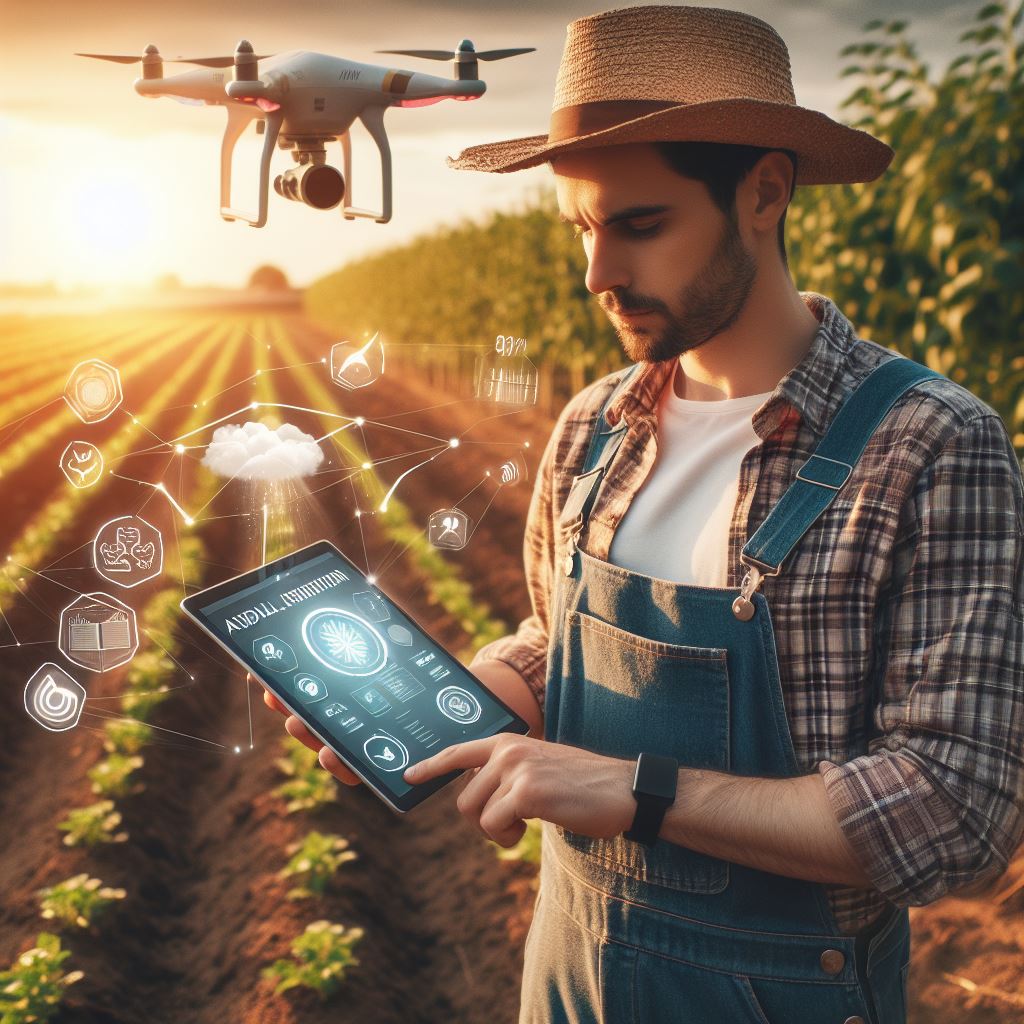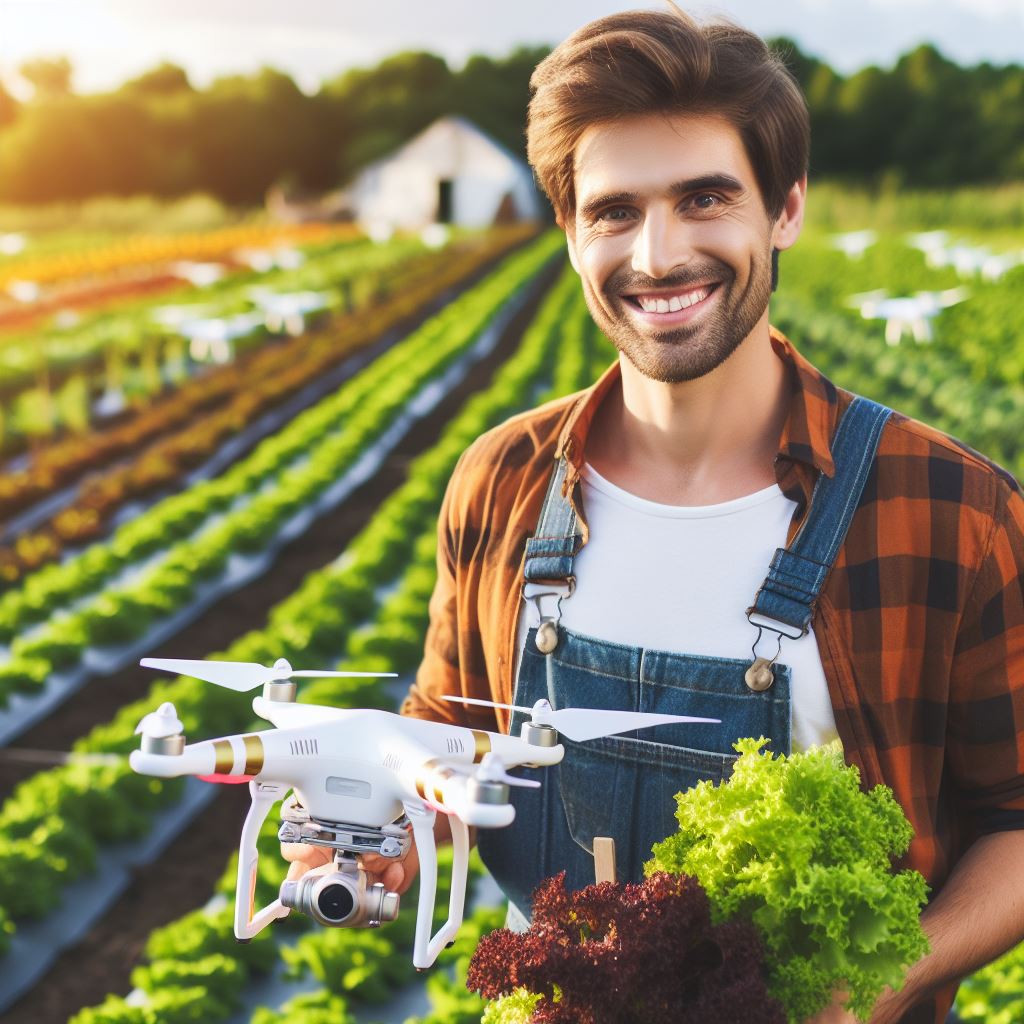Introduction
Smart farming, also known as precision agriculture, is the use of technology to maximize efficiency and productivity in agriculture.
It involves the integration of various technologies such as sensors, drones, and machine learning algorithms to monitor and control farming operations.
In this blog section, we will explore the journey of a family that has embraced smart farming and is reaping the benefits of this tech transformation.
The family, led by John and Sarah Smith, have been traditional farmers for several generations.
However, they recently decided to adopt smart farming techniques to stay competitive in the industry and ensure the long-term sustainability of their farm.
The Smiths began their tech transformation by implementing sensor technology to monitor soil moisture levels. This allowed them to optimize their irrigation practices and reduce water wastage.
They also installed weather stations to collect real-time weather data, enabling them to make informed decisions about crop management.
Furthermore, the family invested in drone technology to conduct aerial surveys of their farm.
This allowed them to identify problem areas and take swift action to prevent crop diseases and pests.
Additionally, they utilized advanced analytics to analyze data collected from their farm machinery, optimizing the use of fertilizers and reducing chemical waste.
The Smiths’ tech transformation in smart farming has revolutionized their productivity and yield.
With the ability to make data-driven decisions and automate farming processes, they have seen a significant increase in their profits and sustainability.
In the following sections, we will delve deeper into the specific smart farming technologies adopted by the Smith family and explore the benefits and challenges they faced.
Their story serves as an inspiring example for other farmers contemplating a tech transformation in agriculture.
Why the Family Embraced Smart Farming
Realize the potential benefits
Smart farming provided the family with an opportunity to transform their traditional farming practices.
Transform Your Agribusiness
Unlock your farm's potential with expert advice tailored to your needs. Get actionable steps that drive real results.
Get StartedThey realized that by incorporating technological innovations into their operations, they could revolutionize their entire farming system.
With a deep understanding of the potential benefits, they were determined to embark on this transformative journey.
Desire to improve efficiency and productivity
Improved efficiency and productivity were among the primary reasons why the family embraced smart farming.
They recognized that by using advanced tools and technologies, they could automate various tasks and minimize human error.
This would not only save them time but also increase their overall productivity and output.
Sustainability as a driving factor
Furthermore, sustainability was a key driving factor behind the family’s decision to adopt smart farming.
They wanted to implement environmentally friendly practices that would help preserve natural resources and reduce pollution.
Smart farming allowed them to employ precision agriculture techniques and use resources more efficiently.
The family’s curiosity and interest in technology were also pivotal in their embrace of smart farming.
They were fascinated by the potential of using sensors, drones, and other cutting-edge technologies in their farming practices.
They saw technology as a tool that could help them make informed decisions, improve crop yields, and optimize resource management.
By combining their passion for farming with their fascination for technology, the family embarked on a journey of digital transformation.
Curiosity and interest in technology
Their curiosities motivated them to explore new possibilities and find innovative ways to enhance their farming processes.
Embracing smart farming was a natural evolution for the family, as they were always open to learning and adopting new technologies.
They believed that staying up-to-date with the latest advancements was essential to remain competitive in the modern agricultural landscape.
Smart farming not only offered the potential for increased profitability but also gave the family the ability to contribute to sustainable farming practices.
It empowered them to become more efficient, productive, and environmentally conscious farmers.
With their newfound knowledge and enthusiasm, the family wholeheartedly embraced the benefits of smart farming.
They were excited to see how technology would revolutionize their farming operations and lead them into a more prosperous future.
As they embarked on this technological transformation, the family was eager to share their experiences and inspire others to follow suit.
They knew that by embracing smart farming, they were not only improving their livelihood but also contributing to the overall advancement of the agricultural industry.
The technology implemented
In their quest for efficiency and sustainability, one family has embraced the transformative power of technology in their farming operations.
Automated irrigation systems
The family has installed state-of-the-art automated irrigation systems to optimize water usage in their fields.
These systems are equipped with sensors and timers to ensure that crops receive the right amount of water at the right time, without any manual intervention.
Showcase Your Farming Business
Publish your professional farming services profile on our blog for a one-time fee of $200 and reach a dedicated audience of farmers and agribusiness owners.
Publish Your ProfileSensor networks for monitoring crops
To closely monitor the health and growth of their crops, the family has set up sensor networks across their fields.
These sensors collect data on soil moisture levels, temperature, and humidity, providing real-time insights to help farmers make informed decisions about irrigation and fertilization.
Drones for surveillance and data collection
Employing cutting-edge drone technology, the family can now conduct regular surveillance of their vast farmland.
Drones equipped with high-resolution cameras capture images and videos, which are analyzed to identify potential pest infestations or areas of crop stress.
This helps them take timely action to prevent yield losses.
Cloud-based software for data analysis
All the data gathered from the various monitoring systems is stored and analyzed using cloud-based software.
This allows the family to access information from anywhere, at any time, facilitating informed decision-making.
The software also generates customized reports, enabling farmers to track the progress of their crops and plan future strategies.
Integration of IoT devices
- In a bid to streamline their farming operations further, the family has integrated various Internet of Things (IoT) devices.
- These devices, such as smart weather stations and soil nutrient sensors, continuously collect data and transmit it to the central system.
- This integration enables farmers to make data-driven decisions and improve overall productivity.
In short, this family’s adoption of smart farming technologies showcases the immense potential of integrating technology into agriculture.
Automated irrigation systems, sensor networks, drones, cloud-based software, and IoT devices have all played a vital role in driving efficiency and sustainability on the farm.
As technology continues to advance, more farmers must embrace these innovations and unlock the numerous benefits they offer for farming and food production.
Read: Montana Wheat: A Sustainable Farming Story
Benefits of smart farming
Improved crop yield
In the world of agriculture, smart farming has revolutionized the way crops are grown. With the integration of technology, farmers have witnessed significant improvements in crop yield.
Smart farming techniques utilize innovative technologies such as sensors, drones, and IoT devices to monitor and analyze various aspects of crop growth.
These technologies provide real-time data on factors like soil moisture, temperature, and nutrient levels.
By having access to this data, farmers can make informed decisions about when and how much to irrigate, fertilize, or harvest.
This targeted approach ensures that crops receive the optimal conditions for growth, resulting in higher yields.
Efficient resource management
One of the key advantages of smart farming is its ability to optimize resource management. Traditional farming methods often involve wasteful practices that can lead to overuse or misallocation of resources.
Smart farming technologies allow farmers to precisely control and monitor resource usage.
For example, with the help of sensors and automated irrigation systems, water can be delivered directly to the roots of plants, reducing water consumption and minimizing wastage.
Similarly, by utilizing data analysis and predictive analytics, farmers can optimize the use of fertilizers and pesticides.
This not only saves costs but also minimizes the environmental impact of chemical applications.
Minimized pest damage
Pest infestations have always been a nightmare for farmers, leading to significant crop loss and financial setbacks.
However, with the advent of smart farming, pest management has become more efficient and effective.
By leveraging data analysis and real-time monitoring, farmers can identify potential pest threats before they escalate.
Sensors can detect changes in plant health, enabling farmers to take immediate action and prevent further damage.
Moreover, smart farming techniques offer alternatives to chemical pesticides.
For instance, drones equipped with thermal sensors can detect pests, allowing farmers to target specific areas without harming beneficial insects or pollinators.
Enhanced decision-making through data analysis
- Data analysis is a cornerstone of smart farming, and it plays a vital role in improving decision-making processes.
- By collecting and analyzing vast amounts of data, farmers gain valuable insights into their operations.
- With advanced analytics tools, farmers can gain a deeper understanding of variables that affect crop growth, such as weather patterns and market demand.
- This enables them to make more informed decisions regarding planting schedules, crop selection, and market strategies.
- Furthermore, data-driven decision-making can lead to increased profitability.
- By analyzing yield data over multiple seasons, farmers can identify trends and patterns, enabling them to adjust their practices and maximize profits.
In essence, smart farming offers numerous benefits to farmers.
From improved crop yield to efficient resource management, minimized pest damage to enhanced decision-making through data analysis, the advantages are clear.
As technology continues to advance, the future of farming looks promising, allowing farmers to overcome challenges and thrive in a rapidly evolving industry.
Read: California Almond Farms: Eco-friendly Tales
Challenges faced during the tech transformation
During their tech transformation, the family faced several challenges that needed to be addressed and overcome.
These challenges can be broadly categorized into initial investment and cost considerations, the learning curve, and technical issues.
Initial investment and cost considerations
Implementing smart farming technologies requires a significant upfront investment. The family had to evaluate the costs and assess the potential return on investment before committing to the transformation.
They had to consider purchasing sensors, automation systems, software, and other necessary equipment, all of which could be expensive.
They also had to factor in ongoing costs, such as software updates, maintenance, and any additional services required.
The financial viability of the transformation played a crucial role in deciding to invest in smart farming technologies.
Learning curve and training required
Transitioning from traditional farming to a tech-driven approach comes with a learning curve. The family had to acquire new knowledge and skills to efficiently operate the smart farming systems.
They attended training sessions and sought guidance from experts to understand the intricacies of the technology they were implementing.
Showcase Your Farming Business
Publish your professional farming services profile on our blog for a one-time fee of $200 and reach a dedicated audience of farmers and agribusiness owners.
Publish Your ProfileLearning to interpret data generated by sensors and managing automated systems required time and effort. However, the family was determined to adapt and embrace the learning process.
Technical issues and troubleshooting
Despite careful planning and implementation, technical issues can unexpectedly arise.
The family had to deal with occasional glitches in their smart farming systems, which required troubleshooting to ensure uninterrupted operation.
- They regularly updated software and firmware to patch any bugs and implemented rigorous maintenance schedules to keep the equipment in optimal condition.
- Troubleshooting technical issues became an integral part of their daily routine, enabling them to overcome challenges promptly.
- Through perseverance and dedication, the family successfully tackled the challenges presented by the tech transformation.
- Despite the initial investment, they reaped the benefits of improved efficiency, reduced costs, and increased productivity in the long run.
- Adopting smart farming technologies allowed the family to stay ahead of the industry’s evolving landscape and make data-informed decisions.
- They overcame the initial skepticism and embraced the opportunities presented by the rapidly advancing field of agriculture technology.
Their experience serves as an inspiration for other farming families who may be contemplating a tech transformation.
While challenges are inevitable, with the right approach and determination, the rewards can be transformative for both the farm and the family.

Results and Impact
Increased profitability for the family
- The implementation of smart farming technologies has significantly improved the profitability of the family.
- By utilizing precision agriculture techniques, they have been able to optimize crop yields and reduce wastage.
- Their increased productivity has resulted in higher revenues and reduced production costs.
- With data-driven insights, they have been able to make informed decisions that ultimately benefit their bottom line.
- Overall, the family has experienced a substantial increase in their overall profitability.
Reduced environmental impact
- Smart farming practices have also had a positive impact on the environment.
- By utilizing sensors and IoT devices, the family can monitor and control the usage of resources.
- They have been able to minimize water consumption through efficient irrigation systems and precise nutrient application.
- By reducing the use of chemicals and pesticides, they have contributed to the preservation of soil health and biodiversity.
- Their commitment to sustainable farming has resulted in reduced environmental pollution and a healthier ecosystem.
Improved work-life balance
- Before adopting smart farming technologies, the family faced numerous challenges in managing their farm and personal lives.
- However, the automation and connectivity provided by smart farming tools have greatly improved their work-life balance.
- Remote monitoring and control of farm operations have allowed them to spend more quality time with their family.
- They can now respond to emergencies quickly without being physically present on the farm at all times.
- The implementation of smart farming has reduced their stress levels and improved their overall well-being.
Inspiration for neighboring farmers to adopt smart farming practices
- The family’s success story in implementing smart farming practices has inspired neighboring farmers to follow suit.
- They have become role models in their community, sharing their knowledge and experiences.
- Through workshops and demonstrations, they have showcased the benefits and effectiveness of smart farming techniques.
- Neighboring farmers have witnessed positive results and are now eager to adopt similar technologies.
- The family’s transformation has sparked a revolution in agricultural practices, leading to widespread adoption of smart farming.
In fact, the implementation of smart farming technologies has had a tremendous impact on the family’s farm.
From increased profitability and reduced environmental impact to improved work-life balance and inspiring neighboring farmers, smart farming has proven to be a game-changer.
The family’s journey serves as a testament to the potential of technology in revolutionizing traditional farming practices.
As more farmers embrace smart farming, the agricultural industry as a whole will become more efficient, sustainable, and productive.
Read: Wine Making: Success in Small Vineyards
Discover More: Green Thumbs Up: Women Leading Organic Farms
Future plans and developments
Further integration of advanced technologies
The family plans to continue integrating advanced technologies into their farming practices. They believe that innovative tools and systems can significantly improve efficiency and productivity.
They aim to explore more options for automation, such as robotics and drones, to streamline various tasks both in the field and in their greenhouse.
By utilizing these technologies, they hope to reduce manual labor and increase overall productivity.
The family also intends to invest in precision agriculture techniques, such as soil sensors and remote monitoring systems.
These tools will provide real-time data on crop health, allowing them to make timely decisions regarding irrigation, fertilization, and pest control.
Collaboration with researchers and experts
Recognizing the importance of staying updated with the latest advancements in smart farming, the family plans to collaborate with researchers and experts in the field.
They aim to seek partnerships with universities, agricultural institutions, and technology companies to gain insights and access to cutting-edge technologies.
By working closely with experts, they hope to stay at the forefront of smart farming practices and continue to evolve their farming methods.
Through collaborations, they also aim to contribute to research and development efforts, offering their farm as a testbed for new technologies and providing feedback to improve existing solutions.
Sharing knowledge and experiences with other farmers
The family believes in the power of knowledge sharing and wants to actively contribute to the farming community.
- They plan to organize workshops, seminars, and open field days where they can share their experiences with other farmers.
- By showcasing their successful journey into smart farming, they hope to inspire and educate others about the potential of integrating technology into agriculture.
- The family plans to engage in online forums, social groups, and industry conferences to share and learn from fellow farmers.
- They advocate cultivating a collaborative culture among farmers to drive agricultural innovation and adapt to a rapidly changing world.
Generally, the family’s tech transformation in smart farming is an ongoing journey with exciting plans and developments.
Their commitment to integrating advanced technologies, collaborating with experts, and sharing knowledge reflects their dedication to pushing the boundaries of traditional farming and embracing the future of agriculture.
Read: Iowa Corn Grower Green Revolution Story
Conclusion
The family’s journey into smart farming has been a remarkable evolution.
From traditional methods to embracing cutting-edge technology, they’ve witnessed a transformative impact on their agricultural endeavors.
Smart farming’s efficiency, data-driven insights, and sustainable practices have not only improved yields but have also minimized resource usage.
The integration of sensors, drones, and data analytics has empowered the family to make informed decisions and optimize their operations.
In closing, the story of this farming family highlights the potential of smart farming to revolutionize agriculture.
It’s not just about embracing technology for the sake of it; it’s about unlocking a more sustainable and productive future. The lessons learned echo beyond their fields, resonating with farmers worldwide.
As we conclude this section, the call is clear: for the future of agriculture, more farmers should explore and wholeheartedly embrace the possibilities that smart farming offers.
It’s a journey towards a greener, more efficient, and technologically advanced agricultural landscape.
The fields of tomorrow are waiting, ready to be sown with innovation and harvested with the bounties of smart farming.




